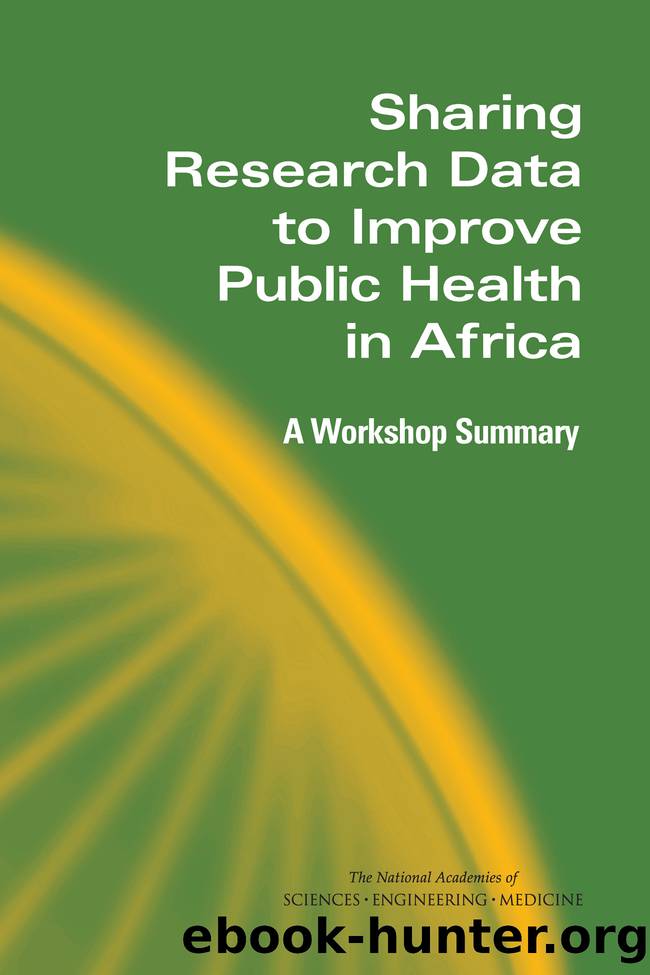Sharing Research Data to Improve Public Health in Africa: A Workshop Summary by Mary Ellen O’Connell

Author:Mary Ellen O’Connell
Language: eng
Format: epub
Publisher: The National Academies Press
Published: 2015-10-01T00:00:00+00:00
The project included five qualitative studies along with a systematic scoping review of the literature. Bull agreed with previous presenters that if data sharing is done properly, it can improve science, and if not, it will hamper science. She observed that the arguments for and concerns about data sharing are two sides of the same coin, which underpins the point that âto achieve the advantages of data sharing, then we really need to look at how we address the concerns arising.â
Bull said the study focused on release of individual-level data, not aggregate data, and on studies of public health and clinical research. The majority of respondents suggested that curation would be needed of some datasets. The reasons cited for why this was necessary included the need for safeguards, bona fide access restrictions, privacy, less harmful or poor-quality research, and compliance. Researchers in the study also raised concerns about the commitments they made during consent processes. She emphasized that decisions have to be responsive to the context and the nature of the dataset.
Priorities were identified for policy and process development, she said. From the perspective of prioritization of data sharing, questions posed included: Which data should be shared? Why? What standards might be used to prioritize sharing data? What are appropriate data and metadata standards? More broadly, she said, at issue are the requirements and rewards needed for collection and curation of datasets and data sharing.
According to Bull, the empirical research that went along with the systematic review was the key element of the study and it started with the premise of âflipping points.â In this context, flipping points are defined as elements that might make sharing of data that is acceptable to the stakeholders become unacceptable and what is an appropriate response.
Presenters discussed the results of qualitative research focused on understanding the perceptions, experiences, and values of stakeholders in the study sites, repeating themes that had been raised throughout the workshop.
South Africa
Blessing Salaigwana and Spencer Denny presented stakeholder views of key features of good/ethical data sharing within a South African context based on a multisite study where they sampled purposefully three different research organizations: two mostly involved in biomedical research, and the third mostly in social science research. Denny presented some main findings from the first paper that came out of the project. He reported a mixed level of awareness among their participants of the procedures and policies or issues related to sharing data, but a general consensus that sharing individual-level data at both the local and international level is for the greater good. According to one assistant investigator, â. . . the more that data is made available the more likely it is to lead to scientific impact.â
He said the exploration of questions tied to why to share data boiled down to three issues:
the recipient of the data who would be conducting the secondary analysis,
the value by participants of altruistic action that has global value, and
the tension between benevolence and competition.
Download
This site does not store any files on its server. We only index and link to content provided by other sites. Please contact the content providers to delete copyright contents if any and email us, we'll remove relevant links or contents immediately.
Whiskies Galore by Ian Buxton(41995)
Introduction to Aircraft Design (Cambridge Aerospace Series) by John P. Fielding(33122)
Rewire Your Anxious Brain by Catherine M. Pittman(18644)
Craft Beer for the Homebrewer by Michael Agnew(18237)
Cat's cradle by Kurt Vonnegut(15338)
Sapiens: A Brief History of Humankind by Yuval Noah Harari(14369)
Leonardo da Vinci by Walter Isaacson(13318)
The Tidewater Tales by John Barth(12652)
Thinking, Fast and Slow by Kahneman Daniel(12267)
Underground: A Human History of the Worlds Beneath Our Feet by Will Hunt(12090)
The Radium Girls by Kate Moore(12018)
The Art of Thinking Clearly by Rolf Dobelli(10455)
Mindhunter: Inside the FBI's Elite Serial Crime Unit by John E. Douglas & Mark Olshaker(9324)
A Journey Through Charms and Defence Against the Dark Arts (Harry Potter: A Journey Throughâ¦) by Pottermore Publishing(9273)
Tools of Titans by Timothy Ferriss(8368)
Wonder by R. J. Palacio(8098)
Turbulence by E. J. Noyes(8040)
Change Your Questions, Change Your Life by Marilee Adams(7760)
Nudge - Improving Decisions about Health, Wealth, and Happiness by Thaler Sunstein(7693)
